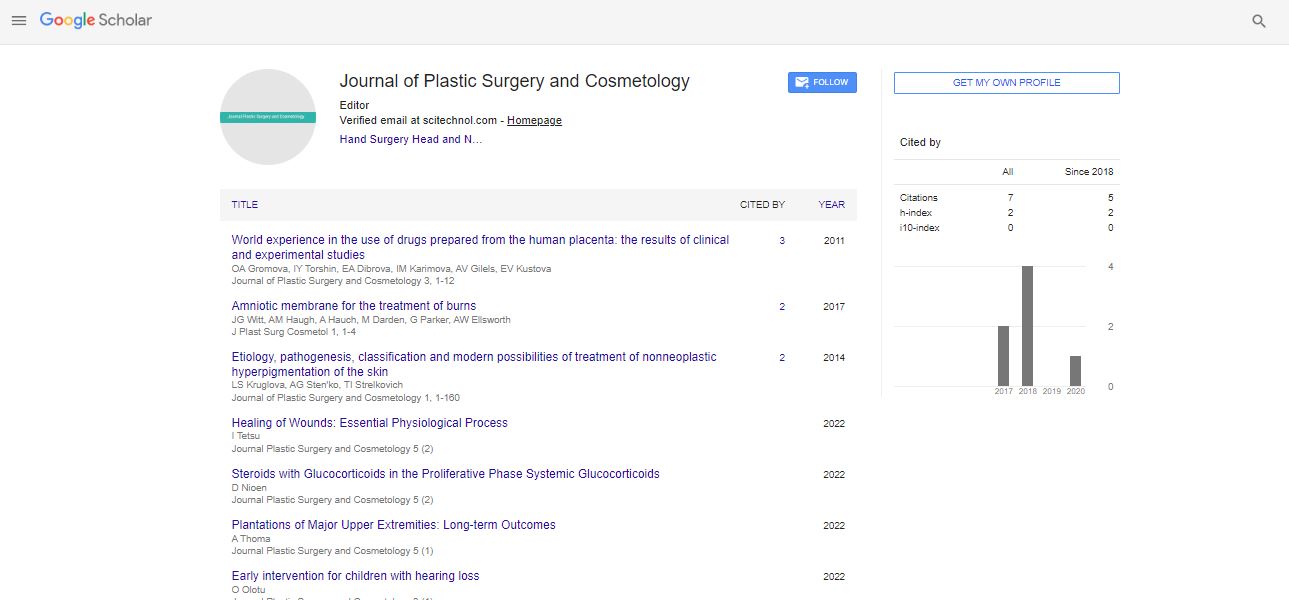Opinion Article, J Pls Sur Cos Vol: 12 Issue: 2
Exploring the Effectiveness and Long-Term Results of Bariatric Surgery: A Comprehensive Analysis
Shelly Szomstein*
Department of General Surgery, Mackay Memorial Hospital, Taipei, Taiwan
*Corresponding Author: Shelly Szomstein,
Department of General Surgery, Mackay Memorial Hospital, Taipei, Taiwan;
E-mail: Szomsteinhelly545@hotmail.com
Received date: 29 May, 2023, Manuscript No. JPSC-23-106769;
Editor assigned date: 31 May, 2023, PreQC No. JPSC-23-106769(PQ);
Reviewed date: 14 June, 2023, QCNo JPSC-23-106769;
Revised date: 21 June, 2023, Manuscript No. JPSC-23-106769(R);
Published date: 30 June, 2023, DOI: 10.4172/JPSC.100050
Citation: Szomstein S (2023) Exploring the Effectiveness and Long-Term Results of Bariatric Surgery: A Comprehensive Analysis. J Pls Sur Cos 12:2.
Description
Bariatric surgery has emerged as an effective treatment option for individuals with severe obesity. This study provides an overview of bariatric surgery procedures, focusing on their efficacy and long-term outcomes. The different surgical techniques, including gastric bypass, sleeve gastrectomy, and adjustable gastric banding, are discussed in detail, along with their associated risks and benefits. Additionally, it examines the impact of bariatric surgery on obesity-related comorbidities, such as type 2 diabetes, hypertension, and obstructive sleep apnea. Long-term follow-up studies are presented to assess weight loss maintenance and the durability of metabolic improvements. Finally, it explores the psychosocial aspects of bariatric surgery, including its effect on mental health, quality of life, and body image perception.
The prevalence of obesity has reached epidemic proportions worldwide, leading to significant healthcare burdens. Bariatric surgery has become an important intervention for individuals with severe obesity that has been unable to achieve sustainable weight loss through nonsurgical approaches.
Significance
While weight loss is a significant outcome of bariatric surgery, its effects extend far beyond mere numbers on the scale. Bariatric surgery has been shown to have a transformative impact on various aspects of long-term health. Studies reveal its positive influence on obesity-related comorbidities, such as type 2 diabetes, hypertension, sleep apnea, and cardiovascular disease. Many patients experience substantial improvements or even remission in these conditions postsurgery, leading to enhanced overall health and reduced mortality risk.
Furthermore, bariatric surgery has been linked to improvements in quality of life, mental health, and psychosocial well-being. Patients often report enhanced self-esteem, improved body image, and increased social confidence. These psychosocial changes can have a profound ripple effect, positively influencing relationships, professional opportunities, and overall life satisfaction.
Precautions
Bariatric surgery has consistently demonstrated significant and sustained weight loss compared to nonsurgical interventions. Gastric bypass, sleeve gastrectomy, and adjustable gastric banding are the most commonly performed procedures. These surgeries not only result in substantial weight reduction but also lead to improvements in obesity-related comorbidities, including remission of type 2 diabetes, reduction in hypertension, and resolution of obstructive sleep apnea. Long-term follow-up studies have shown that the metabolic benefits of bariatric surgery can be maintained over several years. However, some patients may experience weight regain or the recurrence of comorbidities, emphasizing the need for lifelong lifestyle modifications.
In addition to the physiological effects, bariatric surgery has a significant impact on psychosocial factors. Patients often report improvements in mental health, self-esteem, and overall quality of life following surgery. However, body image dissatisfaction and adjustment to the postoperative changes may also pose challenges for some individuals. It is essential for healthcare providers to provide comprehensive pre- and postoperative counseling and support to address these concerns. The title emphasizes the notion that bariatric surgery goes beyond weight loss, highlighting the transformative impact it can have on long-term health outcomes. By focusing on the holistic benefits of this procedure, both patients and healthcare providers can better understand and appreciate the comprehensive changes that can occur as a result of bariatric surgery, leading to a healthier, happier, and more fulfilling life.
Conclusion
Bariatric surgery is an effective treatment option for severe obesity, resulting in substantial weight loss and significant improvements in obesity-related comorbidities. Long-term follow-up studies have demonstrated the durability of these metabolic benefits. Nevertheless, a multidisciplinary approach is an important to address the psychosocial aspects associated with bariatric surgery and to promote long-term success.
 Spanish
Spanish  Chinese
Chinese  Russian
Russian  German
German  French
French  Japanese
Japanese  Portuguese
Portuguese  Hindi
Hindi 